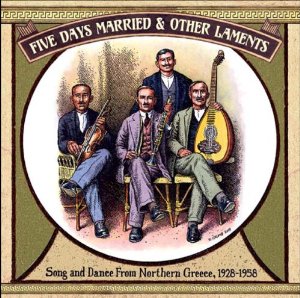 Epirus is een bergachtig gebied in het noord westen van Griekenland. Waar landsgrenzen worden getrokken tussen Albanië en Griekenland, geldt dat nog lang niet voor de muziekgrenzen. De klaagzangen, de miroloi, vertonen veel gelijkenis met de liederen uit Zuid Albanië. De compilatie ‘Five days married & other laments’ geeft een prachtig overzicht van deze miroloi uit de periode 1928/’58.
Epirus is een bergachtig gebied in het noord westen van Griekenland. Waar landsgrenzen worden getrokken tussen Albanië en Griekenland, geldt dat nog lang niet voor de muziekgrenzen. De klaagzangen, de miroloi, vertonen veel gelijkenis met de liederen uit Zuid Albanië. De compilatie ‘Five days married & other laments’ geeft een prachtig overzicht van deze miroloi uit de periode 1928/’58.
English version below
Albanië en Epirus (Noord Griekenland) behoorden eeuwenlang tot het Ottomaanse rijk, maar toch heeft deze streek zijn eigen cultuur behouden. Het moeilijk toegankelijk en bergachtige gebied met zijn zwakke infrastructuur zorgde voor een gesloten gemeenschap en daardoor ontstond een geconserveerde muziekcultuur die typisch is voor het tegenwoordige Zuid-Albanië, Noord Griekenland en zelfs een stukje Macedonië. Muziek was een manier van (over)leven voor de rondtrekkende herders. Op ‘Five days married & other laments’ horen we het hele repertoire: de miroloi, de instrumentale klaagzang voor de doden, gespeeld op klarinet (door de Roma in Griekenland geïntroduceerd midden 18de eeuw) aangevuld met de skáros (lied met vrij ritme), ooit ontstaan door de rondtrekkende herder die ermee zijn kudde kalmeerde. De tis távlas: de drinkliederen en tenslotte de dansmuziek. We vinden het allemaal terug op deze fraaie verzamel-cd die werd samengesteld uit 78-toeren opnamen door Christopher King (foto).
Karakteristiek is de dalende melodie op het eind van een muzikale zin. Iets dat je steevast tegenkomt in de muziek uit Epirus. Op het einde van elke muzikale zin klinkt een soort ‘blue note‘, door het dalen, het glijden van de melodie. Deze wordt gespeeld op klarinet, viool of (meerstemmig) gezongen en geeft de muziek het klagende timbre; hoe vrolijk de dans of zang ook is. Bijzonder is de opname van Halkias Brothers (Athene 1953) waarin dit prachtig te horen is. Net zoals in het lied ‘Mirologi Arvantico’ waarin klarinettist Nikolas Halkias zijn instrument laat huilen en wenen! Prachtig zijn ook de vijf zangers van de Five Gliniotes. Zij zingen het a capella (zonder begeleiding) lied ‘E Vlaha‘ over ‘een jong meisje met een gebroken hart‘. In de vele begeleidingen horen we de luit, klarinet en de viool waarbij de laatste twee de melodie omspelen en de luit zorgt voor de akkoorden. ‘Five days married & other laments’ is een prachtige 78-toeren compilatie waarin opgepoetste opnamen het verleden doen herleven.
English version
Epirus is a mountainous area in the north west of Greece, where musical borders between Albania and Greece split two countries but not the musical elements. Laments, like the Greek miroloi, sound similar like Albanian music. The compilation cd ‘Five days married & other laments’ gives a wonderful overview of the lament between 1928 and 1958.
Albania and Epirus (Northern Greece) were part of the Ottoman Empire for centuries. It’s a hard accessible area with a low infrastructure and a closed society and so it kept it’s own identity, typical for South Albania, Epirus and even a little Macedonia. Music was a way to survive for the shepherds. On ‘Five days married & other laments’ we hear the whole story: the miroloi, the instrumental lament for the death, played on the clarinet (brought by the Roma mid 18th century) added with the skáros (song with free rhythm), once played by the shepherds to calm their sheep. The tis távlas: the drinking songs and the dance music. We find it all on this compilation-cd compiled by Christopher King from 78-rpm records.
Characteristic are the descending tones at the end of a sentence, which you hear in Epirus’ music. After every sentence you hear a kind of ‘blue note‘, by the gliding of the melody. Played on the clarinet, violin or (polyfone) singing. That gives the melody it’s lament feeling, doesn’t matter how jolly or the sad the music is. Special are the recordings of Halkias Brothers (Athene 1953) in which you hear this wonderful sound. Just like the song ‘Mirologi Arvantico’ in which clarinettist Nikolas Halkias let wail and weep his instrument! Spectacular are the Five Gliniotes. They sing the a capella song ‘E Vlaha‘, about a young girl with a broken heart. In the accompanies we hear the lute: the clarinet and the violin improvise around the melody and the lute keeps the harmonies. ‘Five days married & other laments’ is a splendid compilation-cd of 78-rpm records with polished recordings to revive the past.
- ‘Five days married & other laments – Songs and Dance from Northern Greece 1928-1958’ (Angry Mom Records/Xango)
© Mattie Poels.

Epirus is geweldig. De gebroeders Chalkias zijn de beste. Hartverscheurend, hemeltergend. Na al die jaren overdonderd te zijn met crossovers, is pure traditie zo gek nog niet. Ik heb er dozen vol van. Om te delen. Groetjes, Crispijn Oomes